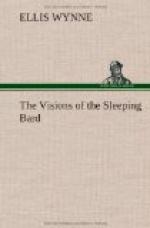At that word I could see an ancient mannikin, bent double, head to feet, like a bramble, straightening himself, and looking at me more malignantly than the red devil, and without a word he hurled a big skull at my head, but, thanks to a sheltering tombstone, missed me. “Truce, sir, I pray you,” cried I, “to a stranger who was never here before, and will never come again, could I but once find the way home.” “I’ll make you remember you’ve been here,” quoth he, and, again setting upon me with a thighbone, he beat me most unmercifully, while I dodged about as best as I could. “Ho ho!” I cried, “this country is very unmannerly towards strangers; is there no justice of the peace here?” “Peace, indeed,” said he, “thou, surely, hast no right to sue for peace, who disturbest the dead in their graves.” “Pray, sir, might I know your name, for I wot not that I have ever molested anyone from this country?” “Sirrah!” cried he, “know then that I, and not you, am the Sleeping Bard, and have been left in peace these nine centuries by all but you,” and again he set upon me. “Withhold, brother,” said Merlin {48a} who stood near, “be not too hasty; thank him rather for that he hath kept your name in respected memory on earth.” “In great respect, forsooth,” quoth he, “by such a blockhead as this. Are you, sirrah, versed in the four and twenty metres? Can you trace the line of Gog and Magog and of Brutus son of Silvius {48b} down to a century before the destruction of Troy? Can you prophesy when, and how the wars between the lion and the eagle, and between the stag and the red deer will end? Can you?” “Ho there! let me ask him a question,” said another who stood by a huge seething cauldron, {48c} “draw near, and tell me the meaning of this:-
“Upon the face of earth I’ll be
“Until the judgment day,
“And whether I be fish or flesh
“No man can ever say.”
{48d}
“I would know your name, sir,” said I, “so that I might the more befittingly give answer.” “I am Taliesin, Chief of the Western Bards, {48e} and those are lines from my mystery-song.” “I know not what your meaning may be, if it be not the yellow plague which destroyed Maelgwn Gwynedd, {49a} slew you upon the sea, and divided you between the ravens and fishes.” “Tush, you




